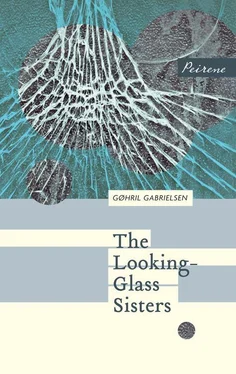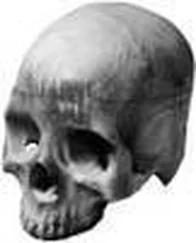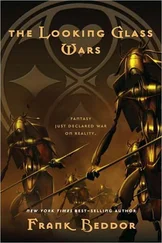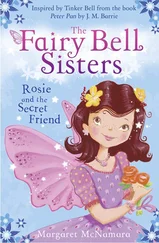One afternoon he was, surprisingly enough, standing outside the house. He had arrived by moped along the bumpy, muddy road, and now he was standing there with mud spattered up his legs and back. I could see him from my bed; he calmly pushed down the side stand, shook the shield a bit, then took a few paces back, looked at the moped from a distance while taking his tobacco out of his pocket. He peered at the house and rolled a cigarette, but showed no signs of intending to knock or make contact. Instead, he lay down in the grass and blew out smoke in large clouds, quite relaxed, as if he had lived here for ages.
Ragna almost stopped breathing. He was right outside! And there she was, face unwashed, hair uncombed. What would he think of her when he saw her like that, a complete shambles?
She shot into her room, dashed around, hardly had time to fix her hair or change sweaters before she felt she had to go out and say hello to him. From the window I could see her face; she approached him nervously, uncertainly, and with a touch of something sweet about her mouth. He watched Ragna coming, but didn’t get up, sat quite still for a moment before throwing his cigarette away and stubbing it out in the grass with his thumb, gazing at her the whole time.
From the sounds in the kitchen I deduced that Mum and Dad were ill at ease; their movements stiffened as they were suddenly like strangers in their own house. Dad coughed and started walking backwards and forwards between the corridor and the kitchen, and Mum peeled the potatoes with a gentle, alert pensiveness.
‘Who is that lad? What sort of chap is he?’ Dad asked several times.
Mum didn’t answer at first, but while clattering with saucepans she called out that Ragna had never told her anything about it, so how could she know.
I sat down in a chair by the window ledge, well to the side, right next to the curtain, so that my interest in the proceedings wouldn’t be too obvious. Dad stood watching me from the corridor, I could sense this from the silence out there and the footsteps that had subsided. When he stuck his head round my door, he didn’t speak, but I knew that he wanted to express something.
I see myself sitting at the window here, see myself slowly turn towards him, silent, but with a serene expression, and I see something inside him go to pieces, there, at the door. I see what I was and could not become, all that was lost and that would grow into raging accusations, be reshaped into lonely bitterness; I can read it in his eyes from here, and I saw it the time when he was standing in the doorway, aware that there was something he ought to say.
When I turned back to the window, Ragna and the young man had disappeared. I searched among the bushes, out across the heather, behind the tree right outside, but I knew that they were already long gone when I discovered the moped tracks through the grass. I unclasped my hands — they were so cold and empty in my lap — and my legs, so tired under the chair, so unnecessary, so alien. What use was this body, what was I going to do with all this flesh, this life I had received?
‘Who is that lad?’ Dad called out again, entering the kitchen. ‘Who is he?’ he asked Mum exasperatedly.
‘I don’t know, I don’t know,’ Mum said time and time again. She had started to wash up some pots and pans.
The silence outside was enormous. I craned my neck, turned my head, pressed my face to the glass. What had become of the sounds from Ragna and the young man? Something caused me to turn towards the corridor. Now both Mum and Dad were standing there looking at me, their faces were dark, their bodies tired and worn out, and I realized, we all did, that I was one of them, the old and the useless, and that I would go on being so, for ever.
‘He’s sure to be a right tearaway. They’re out of control, that lot,’ Mum said to Dad during supper.
Her voice interrupted the silence, hard and rasping compared to the soft clinking of the cups. I was sitting over by the stove, Mum and Dad were at the kitchen table, Ragna’s chair stood empty close to the table. Our glances met from time to time, but occasionally Dad banged his fist down on the table, not hard, more as confirmation of something, and then we looked at each other, briefly.
I asked to be put to bed, I had grown tired of waiting. And I also felt a sudden aversion to sitting there with Mum and Dad.
Outside the window the summer night was still light, full of promise, but I was freezing in my bed, there was a draught that I hadn’t noticed before. I called for my mother and asked for an extra duvet. She shuffled in barefoot and in her nightdress. It must have already been night.
So cold. In the middle of summer. And Ragna still not back! Mum tucked the duvet round me, gave a deep sigh. Get some sleep, she said, we can’t lie awake waiting, all of us.
Ragna was eighteen, at least, no one had the right to insist she stay at home. But when she did come back, many hours later, Dad was waiting in the doorway. And when he asked her where she had been and was met by silence, he demonstrated his authority by hitting her. His hand struck her on the cheek, I could hear it right out where I was, a dull thump, almost metallic. But Ragna still didn’t answer, she went to bed without saying a word.
And I recall smiling faintly, and then feeling the warmth return to my body.
*
The other story I remember took place earlier, the winter when I was seven and Ragna was twelve. We were sitting in the kitchen that evening, Ragna and I, on separate stools pulled away from the table in the middle of room. We stared at each other. Mum was standing behind me with a pair of scissors in her hand, my hair was damp and she had placed a towel over my shoulders. I sat bent forward, my eyes heavy with tears. I had resisted, struggled, but was now in a way prepared, had accepted what was going to happen. Ragna was beaming, tossing her luxuriant half-length hair. It had actually already grown past her thin shoulders, but she was to be spared the scissors, left in peace, while I, with my thin, wispy hair, was to have mine cut.
‘It grows unevenly,’ Mum said. ‘And it’s so thin and fine that it gets into small tangles all over your head.’
So my hair had to be short, and now it was going to be cut off just above my ears.
Ragna sat on her stool and shone, she shone and glittered and tossed her hair, so thick, so long was it that she could plait it, gather it in a ponytail, roll it up and let it cascade down again in long, soft curls. I stared straight ahead, pretended she wasn’t there, didn’t take any notice of her lapping up my humiliation — Mum cutting and my tears falling at every strand of hair that gave way before the scissors.
Afterwards, I sneaked over to the mirror unseen, alone. My eyes had become so big and my head even bigger. My nature was confirmed: I was a stranger in this family and on this earth. While I suddenly realized as much, Ragna appeared out of nowhere and stood beside me. We stared at each other for a long time, from either side of the mirror, I closer, she further back. Nothing was said, but both of us saw what our reflections had to tell.
Was it the day after? No, it was several days later, and it was planned in advance — that was the only way I could avoid suspicion.
She screamed when she woke up, or rather when she picked up her brush that morning and passed it through her hair. Was it possible? During the night, the hours on her pillow, her hair had become snarled in an impenetrable ball, and it was impossible to do anything with this great clump, this thick, unruly haystack of hair all stuck together, entangled in an alarming fashion.
‘God help me,’ Mum sighed as she tried carefully to tease the hairs away from each other.
Ragna screamed and held her forehead with both hands, stared terror-stricken at Mum. Oh, the fear inside her — I could see it from the doorway, where Dad and I were standing.
Читать дальше











